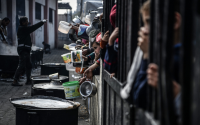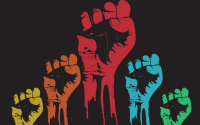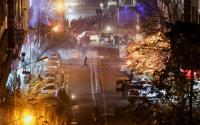22 July 2005The New StandardJon Elmer
Hisham Jamil is unequivocal when asked why he and his wife have chosen a life of unemployment in a foreign country over the life they built together in Baghdad.
"You know why we left," he said as he walked hand-in-hand with his wife, Hamsa, down a busy street here in Jordan’s capital. "The whole world knows why we left. We can’t live in Baghdad anymore; it is as simple as that. Life is impossible."
Jamil, a fashion designer in his now-former life in Baghdad, said his family’s home was destroyed in March 2004 by a massive car bomb that targeted Baghdad’s popular Mount Lebanon Hotel. "Our home was adjacent to the Hotel. It has been structurally damaged to such a degree that selling it is impossible; so too is living in it," Jamil said.
Transcending economic and social class, religion and hometown, the principal reason Iraqis living in Jordan cite for fleeing their country is the ubiquitous violence and instability that has engulfed and suffocated Iraq since the March 2003 US-led invasion of their country.
Rather than focusing on a grand political narrative, Jamil, like virtually all Iraqis who spoke to The NewStandard, stressed the lack of electricity, sanitation, potable water and absense of security that plagues daily life in Iraq. Because of this, he said, "life is impossible on the most basic level."
Carol, a middle-aged beautician and salon owner in Baghdad’s Adhamiyah district, left Iraq in June. She is equally blunt in explaining why she left.
"We are full of frustration and angst," she said over dinner with several Iraqi friends. "No one in the world would leave their home willingly, unless it was under such circumstances."
The violence is, of course, not a mysterious phenomenon to Iraqis. They see it as a direct result of the ongoing occupation.
"At first we believed that America has come to save us from a cursed situation under Saddam Hussein," said Carol. "But in fact they have given us an even greater curse. We have no dignity; we are humiliated. We have no water, no electricity, and no security. We don’t understand. We know the Americans can make the situation better, but they are not."
Popular accounts on the streets of Amman place the number of Iraqis in Jordan seeking refuge from the war at 500,000 and higher, though only a tiny fraction of these people are officially categorized as refugees.
Jordanian Interior Ministry General Secretary Mukhaimer Abu Jamous told TNS that the accepted number of Iraqis in Jordan is more like 300,000 – though he was quick to claim that these are not refugees, but rather people on personal business or vacation.
An official at the United Nations High Commission for Refugees (UNHCR) in Amman said that 15,000 Iraqis had received temporary protection for asylum-seekers pending official refugee status. Only 800 Iraqis have received official refugee status in Jordan, she added, almost all of whom fled during the Saddam Hussein regime. The official refused to allow TNS to report her name, claiming it is UNHCR policy for spokespeople not to be identified in news stories.
According to the official, "only in the rarest of occasions" have those who fled after March 2003 received official designation, and therefore the attendant compensation from UNHCR. All such rare cases are characterized as the "most vulnerable" – primarily the elderly or ill.
A lack of resources makes outreach to those Iraqis who have fled the war impossible for the UNHCR, the official said, and only those who approach the offices are able to navigate the necessary bureaucratic machinations in order to qualify as recognized refugees.
Both the Interior Ministry and the UN agency said that, although they had expected one, there was no influx of Iraqis as a result of the war, and that the flow across the border has been steady but unchanged by the conditions in Iraq. "Influx is a big word, we cannot say that that is what has happened," said Adel Al-Hadid, director of international organizations at the Interior Ministry.
Yet, on the streets of Amman, popular sentiment is that "influx" is exactly the word for it. Whether in the malls, parks, or simply on the street, Iraqis are everywhere in Amman.
While most Iraqis living in Jordan were able to successfully escape the violence of their home country, others, like Suasan Shakir, were not so lucky.
Shakir left the violence of Iraq overland on a makeshift gurney in the collapsed back seat of an SUV. A terrorist attack left her paralyzed in November 2004. A man trying to sneak a bomb into the bank where Shakir worked detonated his deadly burden early when police stopped him at a checkpoint. His payload of explosives killed two officers and sprayed shrapnel throughout the immediate area.
Along with about two-dozen other bank employees being shuttled to work on a minibus, Shakir was waiting at the same checkpoint. Five pieces of shrapnel embedded in her spine, and one penetrated the base of her skull, coming to rest in her brain. She fell paralyzed instantly, losing her ability to see or speak.
The staff at a Baghdad hospital was able to stabilize Shakir’s condition, but her husband says a lack of resources and medicines robbed her of the chance to improve in her home country. Doraid Kadhim Abd-al Hameed took the opportunity to move his wife to Amman in search of better care, presently unavailable in Iraq after fifteen years of sanctions, war and occupation.
In the more than three months since Shakir arrived in Amman, her husband reported, their family has spent upward of $25,000 USD on her care, with no help from any government.
Abd-al Hameed says he has sold everything of value to pay for his wife’s care: his bookstore, a building he rented-out and his car. "I bought my bookstore in 1996 for $10,000," Abd-al Hameed recalled. "Because of the situation in Iraq, I received only $2,000 when I sold it one month ago," he said. His modest monthly income of $200 has been all but eliminated by the sale of his store and the building he owned in Baghdad. The substantial income they claim now is the $125 USD per month Shakir receives from her former employer.
"If we were to take legal action against the British and the Americans – who created this catastrophe for all Iraqis – the problem would be how to even imagine what degree of compensation to ask for," Abd-al Hameed added. "We have lost everything: our future, our families’ future…" His voice trailed off as he choked-back tears.
Shakir’s condition has improved since coming to the Ibn Al-Haytham Hospital in Amman. Last month she began to see for the first time since the accident and her speech is slowly returning, though during a bedside interview, her enunciation was limited, her words slurred.
Yet, in a day or so, Shakir will return to Iraq, the family unable to sustain the costs of treatment in Amman.
"Please, I ask that you put more pressure on the American government – on the Western governments – to pull out of Iraq, immediately," said Abd-al Hameed as Shakir wept.
The Poverty of Diaspora
The package of twelve kitchen sponges with scouring-pads cost pennies each, but for Thayla Kareem they represent hope that she will someday return to her family in southern Iraq. Kareem is one of thousands of Iraqi refugees struggling to make ends meet on the streets of Amman.
Known as the basta – an Arabic term that describes their simple existence, whereby their goods are spread out on cardboard or small mats placed on the ground, rather than in proper market stalls – Iraqi women such as Kareem are fixtures on streets throughout the city.
Dressed from head to toe in traditional, flowing black abaayas, these women sell everything from sponges and toothbrushes to individual cigarettes -- anything that comes cheap and can be resold at a modest profit.
Because of debt incurred starting her small street enterprise, and the meager revenues it brings in, Kareem is stuck in Jordan, hundreds of miles away from her family in Amara, in southern Iraq. "The work is not good enough," Kareem said, squatting in the hot midday sun on the marble steps of a grocery store.
"I pay 30 [Jordanian dinars] every month for rent, electricity and water," noted Kareem. Thirty JD is about $42 USD, a substantial burden on her monthly take. She shares an apartment with seven other Iraqi women – all of them street vendors.
The economic difficulties affect a large swath of the Iraqi refugee population in Jordan. On any given day the downtown parks of Amman are a haven for unemployed Iraqi men, ranging in age from late teens to elders.
Ziad, a 25-year-old originally from Baghdad, now spends his afternoons sitting listlessly in the park beside the Roman Amphitheatre in Amman’s downtown core, along with dozens of other Iraqis.
"I have been here for eighteen months," Ziad said. "I left Iraq after the war, as the resistance began to escalate. I could no longer get to work safely; car bombs and American attacks made such a simple task a gamble for your life."
In the summer of 2003, Ziad said he began to line up for the newly opening positions in the Iraqi Civil Defense Corps and police forces. "But how many bombs exploding in the line-ups would it take before you decided to stop?" Ziad asked rhetorically.
"I would rather be unemployed in Jordan than dead in Iraq," he added flatly.
Ziad said he has had several odd jobs since arriving in Jordan, including one in a restaurant, where his salary was one-half that of his Jordanian coworkers. He quit, frustrated at the wage discrimination.
"I search each day for work," Ziad insisted, "but everyone says the same thing: ‘I’ll call you back.’ They never do."
There is a degree of resentment, simmering just below the surface, toward the Iraqis living among Jordanians, believing their arrival has driven prices up dramatically. A Jordanian taxi driver put the common nationalist perspective in plain terms: "You see, they sold their country and came here to buy ours."
The competition for "unskilled" labor has become fierce as well, as so-called "illegal" Iraqi refugees have allegedly driven wages down across the board by working for significantly less than the previously prevailing rate. Meanwhile, signs can be spotted in Amman that advertise "Jordanian workers wanted," a not-so-subtle reference to the developing segregation.
Work permits are very difficult to obtain for Iraqis in Jordan, and their cost is often prohibitive. At approximately $225 each, a one-year permit costs more than most "unskilled" jobs pay in a month.
"I have tried so hard to get a work permit," said Hisham Jamil, the former fashion designer. "It seems that it isn’t possible for Iraqis."
Abu Jamous of the Interior Ministry explained that this obstacle is a natural step in protecting Jordanian workers.
Salah, a Shia Muslim from the southern city of Hilla, has been living in Jordan since the fall of Saddam Hussein’s regime in April 2003.
At 27, Salah said he possesses a degree in Computer Science, which should render him a hot resource in Iraq, a country that has experienced a relative boom in Internet access and the spread of technology since the fall of Saddam. Instead, Salah, spray bottle hanging from his pocket, pushes a broom through the Mecca Mall, collecting fallen ketchup packages and random French fries strewn about the bustling food court.
In Amman, Salah lives like many refugees who do not have the support of a wealthy family; that is, in a small apartment that he shares with 15 other Iraqis. He pays only $25 USD a month for his accommodations, "which means I can send the rest home to my family in Hilla," he said.
"I came here for work, to feed my family," he said. His family in Hilla has 20 members dependent almost solely on Salah’s modest wages. Salah said he is the only one of them with work.
Salah works in the mall from 7 a.m. until the mall’s midnight closing, seven days a week. His monthly pay of about $160 USD constitutes significantly less than the $200-plus made by Jordanians for the same work.
This discrimination is simply the reality for most Iraqis who are fortunate enough to find work in Jordan.
Salah obtained his job in housekeeping in April 2003. "Back then, it was relatively easy for Iraqis to work," he said. "But I fear my time is running out. My contract ends at the end of the year." he lamented. When his contract expires, so too does his work permit.
As he sees it, when that happens, Salah will have two options: either obtain an extension on his work permit -- virtually impossible for Iraqis working in the general labor sector unless their employers vouch for them -- or else live illegally and likely unemployed in Jordan, facing the possibility of sanction and deportation.
Abu Jamous said that the Jordanian Public Security Department is "proactive" in working with inspectors from the Department of Labor in seeking out "illegals," as he referred to undocumented immigrants, be they Iraqi or otherwise.
If workers are caught in violation of the typical three-month visas or year-long work permits, Abu Jamous added, they are detained in police custody for seven days before being deported to the third country of their choice. According to the Interior Ministry, immigrants generally choose expulsion to a country like Yemen, which does not require a visa.
"For humanitarian reasons, we cannot deport them back to Iraq if their life is deemed to be in danger there," said Abu Jamous.
Still, that does little to quell Salah’s anxiety about his soon-to-expire permit. "I have to support my family," he said. "I do not know what I will do."






